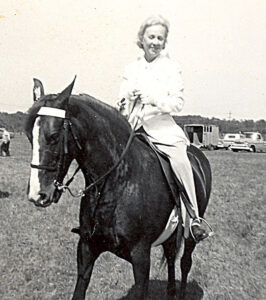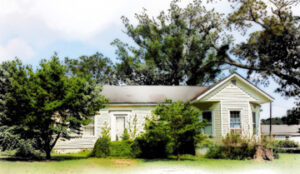 Myrtle Henry Carter initiated the creation of the DeLeon Carter Foundation on April 17, 1987, with a dinner for two original trustees and six founding directors at her home, true to her hospitality as a charming and vivacious Southern hostess. Her 6,000-square-foot signature residence is across South Old Carriage Road from Nash Central High School, just a few hundred yards south of Westry Siding on the Nashville-Rocky Mount railroad. The family’s home place and mercantile store is at the crossing. Both residences serve as visible reminders in the community of the impact of the Carter family and to the ongoing legacy being served by the Foundation’s board of directors.
Myrtle Henry Carter initiated the creation of the DeLeon Carter Foundation on April 17, 1987, with a dinner for two original trustees and six founding directors at her home, true to her hospitality as a charming and vivacious Southern hostess. Her 6,000-square-foot signature residence is across South Old Carriage Road from Nash Central High School, just a few hundred yards south of Westry Siding on the Nashville-Rocky Mount railroad. The family’s home place and mercantile store is at the crossing. Both residences serve as visible reminders in the community of the impact of the Carter family and to the ongoing legacy being served by the Foundation’s board of directors.
Born Myrtle Edwards Carter, Myrtle Henry returned to her Nash County, NC, roots after being widowed in 1960 to live with her mother until Mattie Edwards Carter died in February 1967. Her father, DeLeon Carter, had died in 1956. After moving to the new residence in the mid 1970s and selling the Westry Siding home place in 1991, Myrtle Henry continued to manage and develop business holdings until her death in 1995.
A gracious hostess, as was her mother, Myrtle Henry’s home was regularly open to a circle of friends. They included U. S. Rep. Harold Cooley, the Chairman of the House Agricultural Committee from the 2nd Congressional District; Dr. J. Allen Whitaker, a Rocky Mount physician, and his wife Belle; Ted Strickland of Nashville and his wife Nancy (who stayed in Myrtle’s home briefly as a newly-wed couple) and Ted’s mother Flora Ross Strickland (a lifelong friend for whom Myrtle had maintained a seldom needed pastel blue bedroom and bath); cousin Joe Edwards, Jr., his wife Marjorie, and their children Sarah, Marjorie and Joe, III; British friends Teddy and Elizabeth Garnett of Nashville; Sunday afternoon pianist Ken Watkins; and Verla Vick, a Nashville business woman who handled Myrtle’s personal and farm bookkeeping. The venue was a haven particularly for children, who enjoyed evenings and weekends of games and play and horses to ride.
Dr. Whitaker and Verla Vick were present at the founding dinner. Vick was one of two initial trustees. Whitaker’s son, George G. Whitaker, an attorney, also served as a trustee, and subsequently handled the consolidation of assets upon Mrs. Henry’s death. The others attending included family friend Dr. Matthew T. (Ted) Strickland, cousin W. O. (Billy) Baker, and a first cousin, Joseph F. Edwards, Jr. The other three invitees, known by their local reputation but meeting Myrtle Henry for the first time, were B. Mayo Boddie, Augustus H. (Gus) Tulloss, and George M. Moore.
Mrs. Henry, the two trustees, and the six directors signed the documentation that evening, and by June 4, 1987, each had appeared before a notary for legal verification. The endowed foundation, named to honor the prominent businessman who developed Carter Farms in the Oak Level community, was initiated with $1000 placed in trust. Once the board of directors began to meet, the sessions were also attended by two non-voting participants, Dr. Whitaker and Joseph F. Edwards, III. Gus Tulloss was named chairman, B. Mayo Boddie was named vice chairman, and Ted Strickland was named secretary.
The DeLeon Carter Foundation was subsequently fully funded in accordance with Mrs. Henry’s probated will by liquidation of her home and all her property and assets. This included antique furniture and furnishings, china and silverware, a library of books, and extensive real property and land holdings that included farms in the area from near Nash Community College to the vicinity of the reservoir south of Rocky Mount. Carter Grove subdivision, Forest Cove subdivision, Myrtle Farm subdivision, L&L Convenience Store (on Hwy 97), Fawn Plastics building, and sites that became Old Carriage Road soccer complex and Nash Central High School are all located on properties that were part of the Edwards-Carter farms.
About Myrtle Carter Henry
Myrtle Henry was born at home, Westry Siding, Nash County, North Carolina. She was educated at Nashville School, Ward-Belmont College in Nashville, TN, and New England Conservatory in Boston, MA. Her lifelong interest in the arts sustained her enjoyment of music, her own talents as a painter, and her collections of art and books. It also became manifested in the stated purpose of the trust establishing the Foundation.
She met John Joseph Henry of Lawrence, KS, a Harvard Law School student, married him August 5, 1930, and moved with him to Kansas City, MO, where he practiced law. When Mr. Henry died of leukemia August 6, 1960, after 25 years with the FBI that included time in California and Washington, DC, she returned to Westry Siding and resided with her mother.
Personally managing investments and business interests and farming operations, she acquired mechanical tobacco harvesters and bulk tobacco barns in the early 1970s. She supported the Rocky Mount Saddle Club, and annually hosted the Country Horse Show at her Edwards Farm stables and riding rink. She died September 19, 1995.
About DeLeon Carter
Myrtle Henry’s estate was built upon the holdings inherited from her father. He was born in Elm City in 1878, and became postmaster there at age 16. In 1900 he joined with his uncle John Bailey of Elm City to open Bailey and Carter General Mercantile Store at Westry Siding in the Oak Level community, and purchased it outright in 1932. His expansions in the late 1920s included a cotton gin, a saw mill, a corn mill, and a sheet metal shop (operated for him by John Rackley).
DeLeon Carter married Mattie Edwards of the Oak Level community in 1904. In addition to Myrtle they had two invalid children who were cared for in the home until age three (Meacham) and age 21 (Dick). He served on the board of Planters Warehouse and the board of Planters Cotton Oil Company. He died of leukemia in 1956, and is buried at the Elm City town cemetery in a family plot.
The properties of DeLeon Carter that passed on to his daughter included the following: the Carter Farm (along Hwy 97 beside the reservoir near the Rocky Mount-Wilson Airport); the Edwards Farm (her mother’s family property, purchased by her father, that became the site of Myrtle Henry’s residence on Old Carriage Road); her parent’s home place and store at the Westry Siding railroad crossing; the Hendrick Farm (current site of Nash Central High School); the Craft Farm (extending from Dozier Road to Stoney Creek; and the Polecat Creek Farm;
About Her Will and the Founding Trust
The will had certain preliminary provisions, then it dispersed one-third of the remainder into the trust, one-third to the local Church of the Good Shepherd, and one-third to the Salvation Army in Rocky Mount, NC. It provided for family and friends through various grants ranging from ten to five hundred thousand dollars. It also left funds in trust for Jenny Eley (housekeeper), Ruth Richardson (cook), and Robert Tisdale (farm manager) who had also been maintained in nearby housing. George G. Whitaker served as executor of the estate and trustee of the various trusts created under the will. Some of the assets were in the form of tobacco allotments, and auctioneer Tony Stone of Bailey, NC, facilitated the division of land into parcels and the sale of the real estate by public auction. The sale of the household furnishings, antiques, and collectibles was by public auction handled by Bobby Langston of Wilson, NC.
The purpose of the trust was stated formally in the original trust agreement documentation: “This trust is created and shall be operated exclusively for religious, charitable, scientific, literary, or educational purposes or the prevention of cruelty to children or animals, and no part of the net earnings of the trust estate shall inure to the benefit of any private shareholder or individual, and no part of the direct or indirect activities of the trust shall consist of carrying on propaganda or otherwise attempting to influence legislation or of participating in, or intervening in (including the publication or distribution of statements), any political campaign on behalf of any candidate for public office,”… and continues in the first paragraph of Article II, Section (2), to addressing tax concerns. The second and final paragraph of that section states Mrs. Henry’s expectation that the trust’s focus, and the continuity of directorships, is to be linked to her history and her pattern of concerns for Rocky Mount, Nashville, and Nash County, but not to the extent that those concerns constrain the board’s discretionary powers.
In keeping with the provisions of that original stated purpose, the original directors determined that concerns for the poor had been addressed by one-third of the liquidated assets, and that religious concerns had been addressed by another one-third of the liquidated assets. Accordingly, from the one-third of her estate that funded the trust, the grants awarded during the initial years primarily addressed cultural, aesthetic, and beautification concerns, all very near and dear to the causes supported by Myrtle Henry, the Settlor, during her lifetime.
Attorney George W. Whitaker, the initial trustee, remained in that capacity until fall 2010 when he was succeeded by Vince Durham, an attorney with Battle, Winslow, Scott, and Wiley. Whitaker then was named as a director, filling the vacancy created by the death of Dr. Strickland in 2009. Nancy E. Liipfert was named to the board in June 2003 following the death of George Marvin Moore, and Joseph F. Edwards, III, was named a director in July 2003 upon the resignation of his father. Joe Edwards, Jr., continued to attend board meetings as an honored guest and historical consultant until his death in December 2010. A month before his death he was presented a plaque of appreciation by the Foundation.
Accordingly, 2011 began with the following principals of the trust in place: Vince Durham as trustee; Gus Tulloss as chair; and Mayo Boddie, Billy Baker, George Whitaker, Joe Edwards, III, and Nancy Liipfert as directors.
About the Board Meetings and Grants of the Trust
The first official meeting after the death of Myrtle Henry Carter was held at the Carleton House Restaurant on February 13, 1996. All board meetings were originally scheduled on Tuesday evenings at the Carleton House because this was the day they served their famous grilled pork chops. When it closed 2003, the board began meeting at the Benvenue Country Club.
The board traditionally meets once in the spring and again in the fall. At the fall meeting the board decides which organizations will receive grants. Since it began making grants in 1997, the DeLeon Carter Foundation has given approximately $900,000